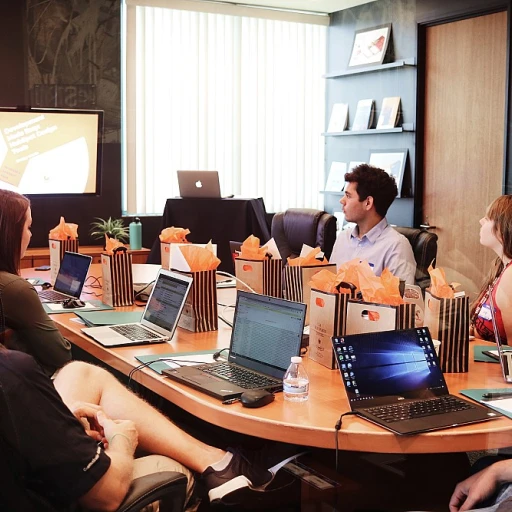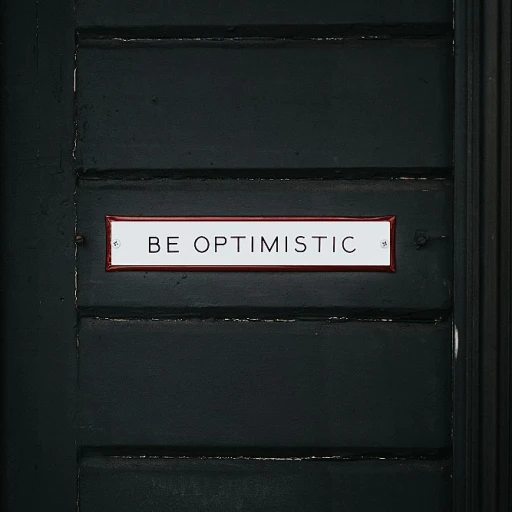
Understanding the Role of AI in Talent Booking
Unveiling AI's Impact on Talent Booking
The transformative power of Artificial Intelligence (AI) in talent booking is reshaping the landscape for hiring managers, recruiters, and agencies alike. AI's role is vast, offering capabilities that optimize the recruitment process by assisting with repetitive tasks and enhancing candidate experience. This evolution is especially noticeable in the ways it helps recruiters manage data, streamline interviews, and refine decision-making. AI assistants, designed to support those involved in recruiting, serve as an additional layer of efficiency. They leverage sophisticated algorithms to parse through vast pools of candidates, ensuring that only qualified candidates are shortlisted. These AI-driven tools excel in real-time data analysis, which assists in modifying job descriptions to attract the best talent and improve the overall recruitment process.Time Efficiency and Productivity
Incorporating AI in talent booking significantly boosts time efficiency. With AI's ability to handle tasks such as interview scheduling and candidate data analysis, hiring managers and recruiting assistants can focus more on strategic decision-making rather than being overwhelmed by administrative duties. This not only speeds up the hiring process but also enhances the quality of talent acquisition by allowing human agents to concentrate on the nuances of candidate engagement. AI's integration into platforms like LinkedIn provides recruiters with a more comprehensive view of potential candidates and automates the sourcing process. As these tools continuously update with real-time data, they offer unparalleled insights that help refine the approach to hiring. For further insights into optimizing candidate sourcing and recruitment with AI, explore how tech talent can be effectively found by mastering the art. This synergy between humans and technology is setting the stage for a new era in recruitment, enhancing both productivity and talent acquisition.Key Features of AI Assistants for Talent Bookers
Transforming Talent Acquisition with AI-Powered Tools
The integration of AI assistants into the recruitment process is rapidly reshaping how talent professionals like recruiters and hiring managers approach their tasks. These advanced tools are designed to help recruiters and streamline workflows by automating repetitive tasks, thereby enabling recruiters to focus on more strategic aspects of talent acquisition.
When it comes to interview scheduling, AI assistants can save significant time by automating the coordination between candidates and hiring managers. By handling calendar management, these assistants ensure a smooth interview process, enhancing the candidate experience as well as efficiency.
AI assistants excel at data analysis and decision making. They are equipped to sift through vast amounts of data from platforms like LinkedIn to identify qualified candidates who align with job descriptions. This not only aids in finding the right candidates but also helps recruiters understand market trends and talent availability in real time.
Moreover, these tools are invaluable in crafting personalized candidate engagement strategies. With the capability to analyze past interactions and preferences, AI tools can assist in creating tailored communication plans, which are crucial for maintaining a positive customer support experience during recruitment.
The role of a recruiting assistant is further enhanced by AI's ability to offer insights and recommendations. These tools function as a virtual agent, providing talent bookers with data-driven suggestions to improve hiring strategies, whether by refining candidate requirements or optimizing the recruitment process.
Discover more about enhancing candidate sourcing with AI for applicants to delve deeper into how these technologies continue to transform talent booking.
Benefits of Using AI in Candidate Sourcing
Unlocking the Full Potential of AI in Talent Acquisition
In the hiring process, incorporating AI can vastly improve candidate sourcing and facilitate more efficient decision-making for hiring managers. One of the primary advantages of using AI is its ability to handle large volumes of data in real time, providing immense value in a recruitment process often bogged down by repetitive tasks. AI-powered tools can assist recruiters by performing initial candidate screening, evaluating job descriptions, and even optimizing the entire recruitment process. These tools can quickly assess candidates' skills and experiences through platforms like LinkedIn, offering more time for recruiters to engage with the most qualified candidates directly. Thus, AI serves not only as an assistant to human recruiters but also as a transformative agent in refining the candidate experience. Additionally, AI helps with interview scheduling and tracking candidate progress, aspects that traditionally demand substantial time and effort from recruiting assistants. By delegating these tasks to an AI assistant, human recruiters can focus on strategic aspects of talent acquisition, such as engaging candidates and providing personalized customer support. Moreover, data-driven insights offered by AI facilitate targeted recruiting efforts and help recruiters better understand candidate expectations. This significantly enhances decision-making, enabling hiring managers to identify and attract top talent more effectively. For those exploring AI-driven recruitment solutions, it's crucial to understand how to navigate and manage applicant data. For a detailed guide, consider exploring resources on optimizing the process of managing applicant data. These insights are designed to help increase efficiency in recruitment practices and strengthen talent acquisition strategies.Challenges and Considerations in AI-Driven Talent Booking
Addressing the Hurdles in AI-Powered Recruitment
In the ongoing quest to streamline the hiring process and enrich the recruitment experience, AI stands as a dual-agent—a helper in some aspects yet a potential hindrance in others. While AI assistants have indeed proven invaluable for recruiters, there are notable challenges and considerations the industry must heed.
Firstly, the integration of AI in the recruiting landscape disrupts traditional methods, requiring an overhaul of existing processes. Recruiters must acclimate to tools and technologies that facilitate real-time data analysis and decision making, from LinkedIn hiring dynamics to interviewing and scheduling tasks. This transition can be labor-intensive, with initial resistance to change potentially hindering the adoption of AI across talent acquisition teams.
Moreover, the reliability on AI systems raises questions regarding the accuracy and fairness of these digital agents in assessing candidates. AI algorithms, while designed to accelerate repetitive tasks and enhance efficiency, still face scrutiny over biases embedded in their data. These biases can surface during the recruitment process, influencing the selection of qualified candidates. It’s crucial that recruiters remain vigilant, continuously updating the data fed into these systems to mitigate potential biases.
There's also the risk of AI systems overshadowing the human element of recruiting. Candidate experience, a critical factor in talent booking, can suffer if not balanced correctly with AI tools. While AI can assist in sorting through vast pools of candidates and aligning them with precise job descriptions, human recruiters must ensure that they maintain a personalized approach to applicant interactions, from initial contact to final decision-making stages.
Further consideration must be given to data privacy concerns. With AI systems processing extensive candidate information, safeguarding this data against breaches is paramount. Recruiters must work in conjunction with IT departments and legal teams to establish robust privacy protocols, thus maintaining trust and credibility with both candidates and hiring managers.
Ultimately, while AI-driven recruitment represents a leap forward in capability and efficiency, its challenges cannot be overlooked. For the industry to wield these digital assistants effectively, recruiters must remain proactive in addressing and resolving these barriers, ensuring that AI truly serves as a tool of progress, not an impediment, in the ever-evolving landscape of talent acquisition.
Case Studies: Success Stories of AI in Talent Booking
Illustrating Real-World Implementation of AI in Talent Booking
With AI becoming a cornerstone in the modern recruiting landscape, several organizations have successfully integrated AI-driven tools to revolutionize their talent acquisition processes. These success stories reveal how AI assistants enhance the efficiency and effectiveness of recruiters and talent bookers.- In the entertainment industry, AI tools have been employed to streamline the hiring process of talent agents. These digital assistants handle repetitive tasks, such as sorting through job descriptions and managing interview scheduling with precision. Recruiters found that real-time data analysis delivered insightful decisions, enhancing the candidate experience.
- For recruiting firms handling large volumes of candidates, AI has been pivotal in optimizing time management. AI-powered assistants excel in data aggregation from platforms like LinkedIn, swiftly creating comprehensive candidate profiles. This not only saves time but helps recruiters focus on strategic elements of the hiring process.
- Enterprises have benefited from AI-driven recruitment processes by refining candidate sourcing strategies. Hiring managers report a significant reduction in time-to-hire, as AI tools can quickly identify qualified candidates, freeing human recruiters from mundane tasks to focus on high-value activities.
- In corporate environments, virtual assistants have transformed how hiring managers engage with potential employees. AI agents support customer service functions by managing inquiries and scheduling, enabling smoother interactions throughout the recruitment journey.
Future Trends in AI and Talent Booking
Emerging Technologies Shaping Talent Booking
As AI continues to evolve, its impact on talent booking is becoming increasingly profound. The integration of AI in the hiring process is not just a trend but a transformative shift. AI-driven tools are designed to help recruiters streamline the recruitment process, making it more efficient and effective.
Real-Time Data and Decision Making
One of the most significant advancements is the use of real-time data to enhance decision making. AI assistants can analyze vast amounts of data quickly, providing hiring managers with insights that were previously inaccessible. This capability allows recruiters to identify qualified candidates faster and with greater accuracy, improving the overall candidate experience.
Automation of Repetitive Tasks
AI is also revolutionizing the way repetitive tasks are handled. Tasks such as interview scheduling, job description creation, and candidate communication can be automated, freeing up time for recruiters to focus on more strategic activities. This automation not only increases efficiency but also reduces the risk of human error.
Integration with Platforms like LinkedIn
Platforms like LinkedIn are increasingly integrating AI to enhance their recruiting capabilities. LinkedIn hiring tools are leveraging AI to match candidates with jobs more effectively, helping recruiters find the right talent faster. This integration is a game-changer for talent acquisition, providing a seamless experience for both recruiters and candidates.
AI Assistants as Recruitment Agents
AI assistants are becoming indispensable agents in the recruitment process. These assistants are designed to help recruiters by providing customer support, managing candidate interactions, and even conducting preliminary interviews. By acting as a recruiting assistant, AI can significantly enhance the efficiency of the recruitment process.
Future Prospects in AI-Driven Talent Acquisition
The future of AI in talent booking looks promising, with continuous advancements expected in the coming years. As AI technology becomes more sophisticated, its role in the hiring process will likely expand, offering even more innovative solutions to the challenges faced by recruiters today. The potential for AI to transform talent acquisition is immense, and staying abreast of these developments will be crucial for those involved in recruiting.











